Did you hear a sudden banging noise coming from your walls? Does it sound like water running? If so, you may have a burst pipe on your hands. Pipes bursting can be extremely costly and a huge hassle to fix, so learning the signs of one is key. Read on to learn more about how to spot if one of your pipes has burst and what steps you should take next.
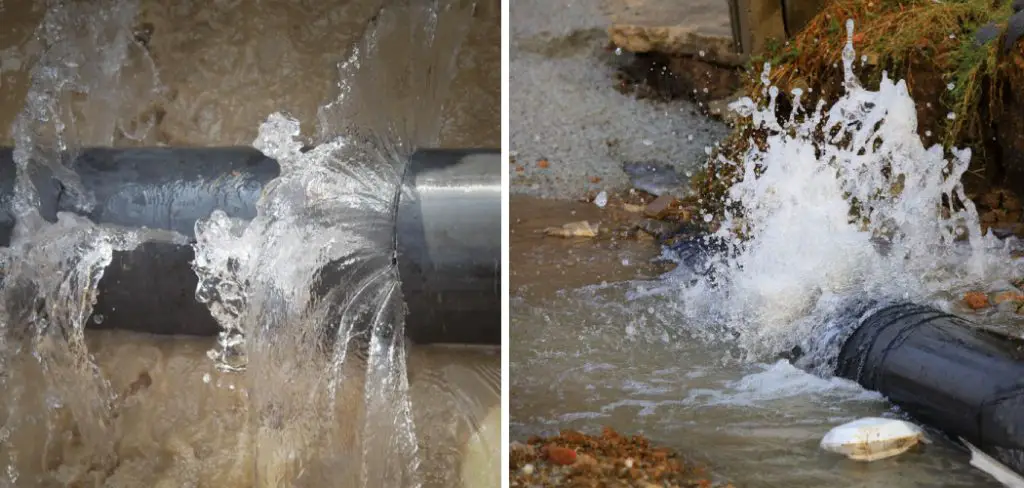
When the temperature drops below freezing, many homeowners are concerned about their pipes bursting. While a burst pipe can cause extensive damage to your home, there are many warning signs that you should look out for in order to detect and prevent this disaster before it happens.
In this blog post, we’ll discuss what to look for and how to tell if your pipes have burst or are at risk of doing so. Keep reading and be sure to take immediate steps to know the answer to “how to tell if your pipes burst?”
What Makes Your Pipes Burst?
There can be many reasons that lead to the bursting of your pipes. Such as:
1. Freezing Temperatures
One of the reasons your pipes may burst is because of freezing temperatures. When temperatures drop below freezing, the water inside your pipes can freeze and expand, causing it to crack or burst open.
If you live in an area where the temperature drops significantly, you should take extra measures, such as insulating exposed pipes or keeping cabinets that house plumbing fixtures open during cold spells.
2. Clogged Pipes
Another common cause of pipe bursting is a clog that builds up in the pipes, causing them to burst due to pressure buildup. This can be caused by various things such as food particles and grease that build up on the interior walls of your pipes or roots from trees growing near underground lines. Make sure to periodically clear out any clogs in your pipes to avoid this issue.
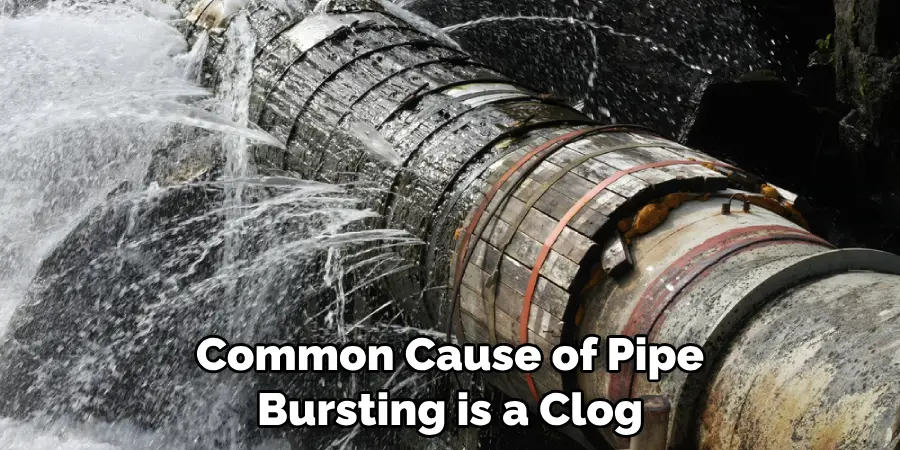
3. Poor Installation or Age of Pipes
If your pipes have been poorly installed, they may be more prone to bursting due to the lack of proper support and insulation. Alternatively, if your home has older pipes that are past their lifespan, there is a greater chance for them to burst due to wear and tear over time.
4. Corrosion
Corrosion of the pipes can also lead to bursting, as the corroded areas can become weak and easily break apart. This is caused by water that contains minerals or chemicals such as chlorine that are potentially corrosive, which can weaken your pipes over time.
5. Water Pressure
High water pressure can also be a factor in pipe bursting if it is too much for the pipes to handle. Make sure to check your house’s water pressure to ensure it’s at a safe level that won’t put stress on the pipes.
How to Tell if Your Pipes Burst: 6 Signs to Look For
To know if your pipes have burst, there are some warning signs you can look out for. These include:
1. Strange Sounds or Noises
You may hear a loud banging noise coming from the walls or fixtures of your home, which could indicate that a pipe has burst. This sound could be caused by water pressure building up in the pipes. If you hear no noise at all from your plumbing, it could also mean that a pipe is blocked or broken, preventing the flow of water.
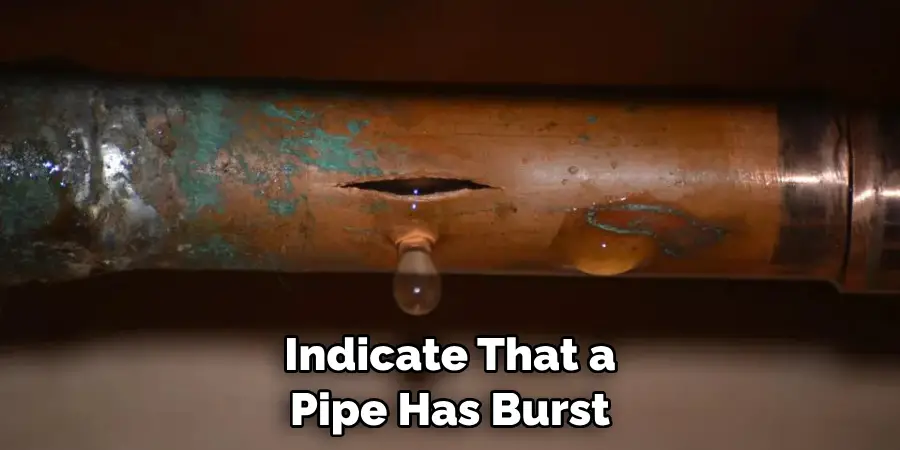
2. Unexpected Increase in Water Bill
If there’s an unexpected increase in your water bill, it could be a sign of a burst pipe. If this is the case, you may also see water stains on your walls or ceilings, as well as wet spots in areas where you wouldn’t normally expect them to be.
3. Decreased Water Pressure
If the water pressure in your home suddenly drops, it could mean a pipe burst somewhere. You may notice that the water pressure is weaker than usual when you turn on the taps or that it takes much longer for your bath to fill up.
4. Visible Signs of Water Damage
A burst pipe can cause visible damage such as wet patches or stains on walls, ceilings, and floors. If these signs are found, it’s important to call a professional right away. Also, check around your home to see if you can spot any wet spots or standing water.
5. Unpleasant Smell
If you smell something musty or damp, it could be a sign of a burst pipe. This is especially true if the smell is coming from walls and ceilings, which indicates water leaking from a hidden pipe. Also, look out for any signs of mold or mildew, which would be an indication that a pipe has been leaking for some time.
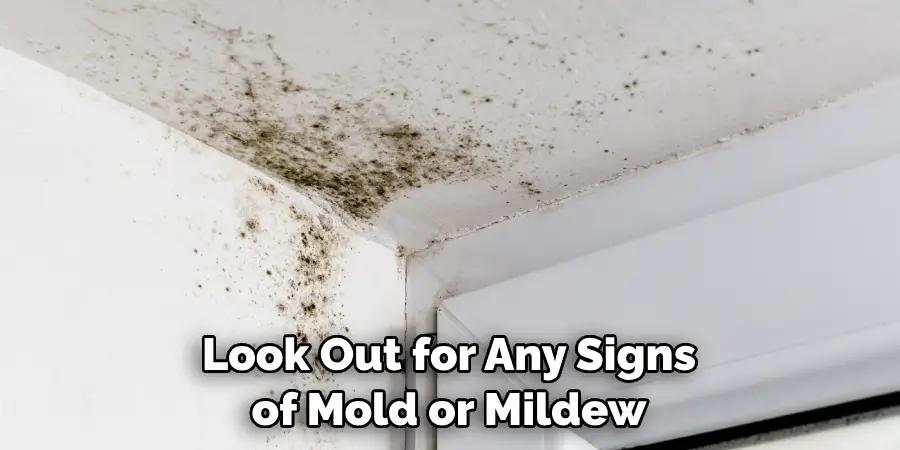
6. Warm Spots on Walls or Floors
If you notice any warm spots on your walls or floors, it could be a sign that water is leaking from a burst pipe behind the wall. This can be dangerous, as it could cause an electrical fire if the wiring gets wet.
If you find any of these warning signs in your home, it is best to contact an experienced plumber as soon as possible. A qualified plumber will be able to locate the source of the problem and fix the burst pipe quickly and efficiently.
Taking quick action can help prevent further damage to your home and save you money in the long run. Taking the time to regularly inspect your home’s plumbing system and clear out any clogs will also reduce the risk of pipes bursting in the future.
Frequently Asked Questions
What Precautions Should I Take To Reduce The Risk Of Pipes Bursting?
To reduce the risk of pipes bursting, take a few simple precautions. First, make sure to properly insulate all exposed pipes, as this will help keep them from freezing in the winter months. Additionally, check for signs of leaking or corrosion regularly and have any necessary repairs done promptly.
It’s also a good idea to open all interior faucets during extremely cold weather, as this will help reduce internal pressure in the pipes and can prevent them from bursting. Finally, be sure to shut off the main water supply if your home is going to be unoccupied for an extended period of time. Taking these steps can help protect your pipes and prevent them from bursting.
What Are Some Signs That My Pipes Have Burst?
If you have a burst pipe, you may notice signs such as water leaking from the walls or ceiling, a decrease in water pressure, and an increase in your water bill. You may also hear strange noises coming from the walls or floor when the water is running.
Additionally, you can check for any signs of wetness or damp spots in your basement, underneath sinks and around toilets. If you suspect a burst pipe, it’s important to address the issue as soon as possible to avoid further damage and costly repairs.
What Should I Do If My Pipes Have Burst?
If you suspect that your pipes have burst, turn off the main water supply right away. This will help limit the amount of damage and prevent further flooding. After that, contact a plumber as soon as possible to inspect the issue and provide a repair solution.
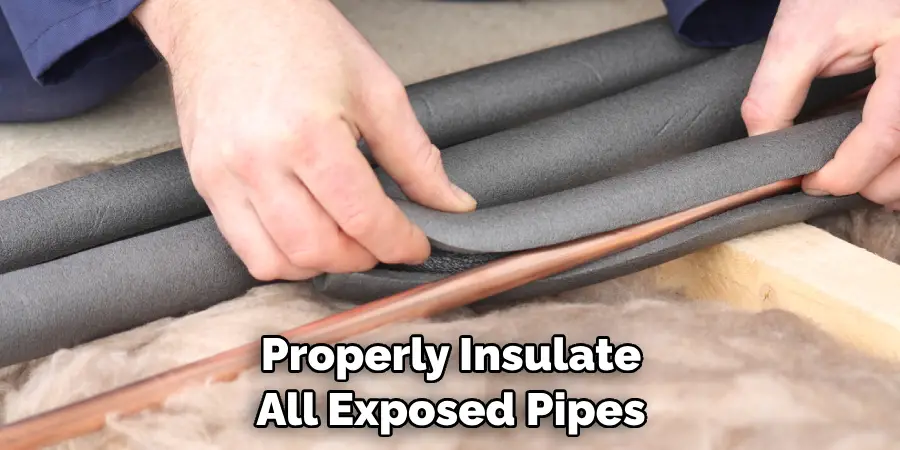
It’s also important to check for any signs of water damage in other areas of your home, as burst pipes can cause water to leak into walls and ceilings. Taking these steps can help ensure that your home is free from any further damage.
By following the tips outlined above, you can reduce the risk of pipes bursting in your home, as well as recognize and address any signs of a burst pipe quickly. In addition to taking preventive measures, it’s important to stay vigilant and check for any signs of leaking or corrosion regularly. Doing so will help keep your home safe from water damage and costly repairs.
Conclusion
Ultimately, determining if pipes have burst in your home can be tricky, but there are a few key signs to look out for. An unexpected soaking of your floors or furniture, a drop in water pressure, and unusual hissing sounds emanating from the walls could all be indicators of broken pipes.
On top of all this, it is always wise to keep an eye on your energy bills, particularly during cold seasons; unexpectedly high readings can also point to damage underneath the surface.
Now you know the answer to “how to tell if your pipes burst!” Thankfully, should you find yourself in such a situation, know that you do not have to tackle it alone – with the help of a reputable plumbing service, you can get back to normalcy quickly and start afresh again.
Taking measures before devastation does occur is certainly preferable, however, these tips should at least ease some misconceptions about how to tell if your pipes burst and start helping you take control immediately.
